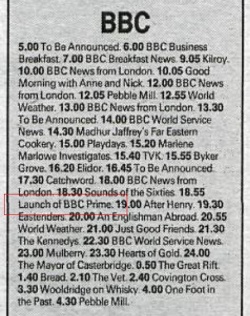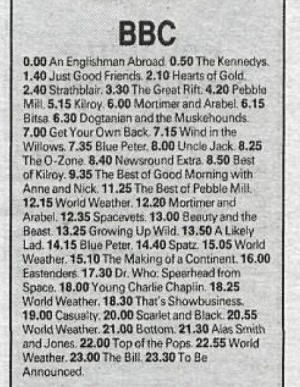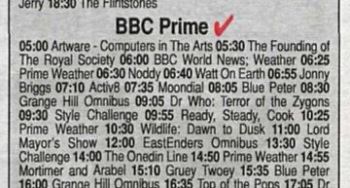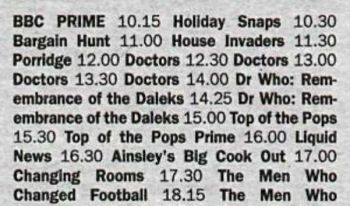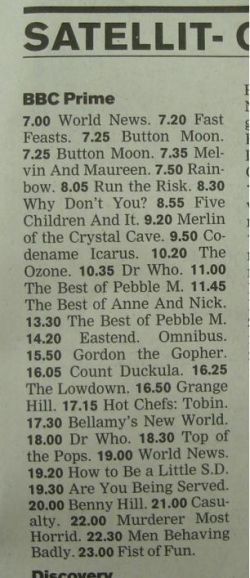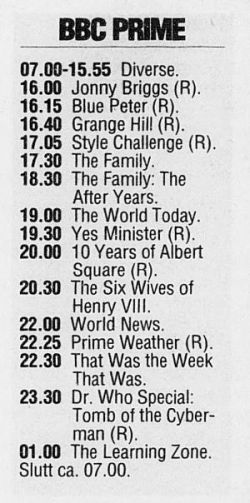Difference between revisions of "BBC Prime"
Jon Preddle (talk | contribs) |
Jon Preddle (talk | contribs) |
||
| (46 intermediate revisions by 2 users not shown) | |||
| Line 1: | Line 1: | ||
| + | [[File:BBCPrimeLogo.jpg|right|frameless]] | ||
| + | |||
[[File:BBCPrimeLaunch.JPG|thumb|250px|right|BBC Prime launched, 26 January 1995]] | [[File:BBCPrimeLaunch.JPG|thumb|250px|right|BBC Prime launched, 26 January 1995]] | ||
| − | + | This cable and satellite channel was launched in 1987 as '''[[wikipedia:BBC TV Europe|BBC TV Europe]]''', serving continental Europe, and was rebranded as '''[[wikipedia:BBC World Service Television|BBC World Service Television]]''' from '''11 March 1991'''. (See our dedicated page -- [[BBC World Service Television Europe]].) | |
| − | This cable and satellite channel was launched in 1987 as '''[[wikipedia:BBC TV Europe|BBC TV Europe]]''', serving continental Europe. | ||
The station transmitted via the [http://wn.com/Intelsat_5 IntelSat] satellite, broadcasting on frequency '''601 27.5º west, at 10,995 and 11,155 gigahertz'''. The station broadcast a mixture of delayed programming originally shown on BBC1 and BBC2. | The station transmitted via the [http://wn.com/Intelsat_5 IntelSat] satellite, broadcasting on frequency '''601 27.5º west, at 10,995 and 11,155 gigahertz'''. The station broadcast a mixture of delayed programming originally shown on BBC1 and BBC2. | ||
| − | + | Most of the programming available in Europe (and later Asia) was subtitled into a number of different languages. | |
| − | + | From '''26 January 1995''', '''BBC World Service''' was split into '''BBC World''' (for news) and '''[[wikipedia:BBC Prime|BBC Prime]]''' (for entertainment). '''BBC Prime''' became the BBC's first entertainment channel available via satellite and cable across Europe, the [[:Category:Middle East|Middle East]] and [[:Category:Africa|Africa]], broadcasting 24 hours a day, and screening a selection of BBC as well as ITV programming. | |
| − | + | The station became available in South East Asian countries from December 2004, however programming on that feed differed to that offered in Europe. Programmes were dubbed into various languages. | |
'''COUNTRIES''' | '''COUNTRIES''' | ||
| − | The new '''BBC Prime''' was available in the following countries, some of which also had previously aired '''Doctor Who''' on their own domestic stations: | + | The new '''BBC Prime''' was available in the following countries, some of which also had previously aired '''Doctor Who''' on their own domestic stations, or had seen the series when the station was called [[BBC World Service Television Europe|BBC World Service]]. (These countries were added to the service over the years, so not all of them always received coverage of the same programmes at the same time). |
| + | |||
| + | [[File:BBCPrimeAAA.JPG|thumb|right|300px|First episode on BBC Prime: Spearhead from Space, 17:30pm, 28 January 1995 (Icelandic newspaper)]] | ||
| + | [[File:ZygonsBBCPrime.JPG|thumb|right|350px|BBC Prime listing in Icelandic newspaper; "Terror of the Zygons" is on at 09.05am, November 1997]] | ||
| + | [[File:DaleksBBCPrime.JPG|thumb|right|350px|BBC Prime listing in Icelandic newspaper; "Remembrance of the Daleks, May 2002]] | ||
| + | [[File:BBCPrime96.JPG|thumb|right|250px|BBC Prime listing in Swedish newspaper; "Dr Who" is on at 10.35am and 18.00pm]] | ||
| + | [[File:BBCPrimePoland1996.JPG|right|thumb|300px|BBC Prime was available in Poland in 1996; from Dziennik Baltycki 30 March 1996]] | ||
| + | [[File:BBCPrimeNov96.JPG|right|thumb|250px|The Tomb of the Cybermen was the only second Doctor serial shown on BBC Prime; 8 November 1996]] | ||
| + | '''EUROPE''' | ||
| + | *[[Austria]] | ||
| + | *Azerbaijan | ||
| + | *Belarus | ||
*[[Belgium]] | *[[Belgium]] | ||
| + | *[[Bulgaria]] | ||
| + | *[[Croatia]] | ||
| + | *[[Cyprus]] | ||
| + | *[[Czech Republic]] | ||
*[[Denmark]] | *[[Denmark]] | ||
| − | *[[ | + | *Estonia |
| + | *[[Finland]] | ||
| + | *[[France]] | ||
| + | *Georgia | ||
| + | *[[Germany]] | ||
| + | *[[Gibraltar]] | ||
| + | *[[Greece]] | ||
| + | *[[Hungary]] | ||
*[[Iceland]] | *[[Iceland]] | ||
| − | *Israel (from June 2000) | + | *[[Ireland]] |
| + | *[[Israel]] (from June 2000) | ||
*[[Italy]] | *[[Italy]] | ||
| − | *[[ | + | *Latvia |
| + | *[[Lithuania]] | ||
| + | *[[Luxembourg]] | ||
| + | *Macedonia | ||
*[[Malta]] | *[[Malta]] | ||
| − | *[[Monaco]] | + | *Moldova |
| + | *[[Monaco]] | ||
*[[Netherlands|The Netherlands]] | *[[Netherlands|The Netherlands]] | ||
*[[Norway]] | *[[Norway]] | ||
| − | *[[Poland]] | + | *[[Poland]] |
| − | *[[ | + | *[[Portugal]] |
| − | * | + | *Romania |
| − | *[[ | + | *[[Russia]] |
| − | *[[ | + | *[[Yugoslavia|Serbia]] |
| + | *[[Slovakia]] | ||
| + | *[[Slovenia]] | ||
| + | *[[Spain]] | ||
| + | *[[Sweden]] | ||
| + | *[[Switzerland]] | ||
*[[Turkey]] | *[[Turkey]] | ||
| − | *[[ | + | *[[Ukraine]] |
| − | *[[ | + | *[[United Kingdom]] |
| − | and | + | |
| + | |||
| + | '''MIDDLE EAST / NORTH AFRICA (MENA)''' | ||
| + | *Afghanistan | ||
| + | *[[Algeria]] | ||
| + | *[[Bahrain]] | ||
| + | *Chad | ||
| + | *Djibouti | ||
| + | *[[Egypt]] | ||
| + | *[[Iran]] | ||
| + | *[[Iraq]] | ||
| + | *[[Jordan]] | ||
| + | *Kazakhstan | ||
| + | *[[Kuwait]] | ||
| + | *[[Lebanon]] | ||
| + | *[[Libya]] | ||
| + | *Mauritania | ||
| + | *[[Morocco]] | ||
| + | *Oman | ||
| + | *Palestine Territories | ||
| + | *[[Qatar]] | ||
| + | *[[Saudi Arabia]] | ||
| + | *Somalia | ||
| + | *Sudan | ||
| + | *[[Syria]] | ||
| + | *[[Tunisia]] | ||
| + | *[[United Arab Emirates]] | ||
| + | *[[Aden|Yeman]] | ||
| + | |||
| + | |||
| + | '''SOUTHERN AFRICA''' (from 1999) | ||
| + | *[[Mozambique]] | ||
| + | *[[South Africa]] | ||
| + | |||
| + | |||
| + | '''ASIA''' (from 2004) | ||
| + | *[[Hong Kong]] | ||
| + | *[[Indonesia]] | ||
| + | *[[Malaysia]] | ||
| + | *[[Nepal]]? | ||
| + | *[[Singapore]] | ||
| + | *[[Korea (South)|South Korea]] | ||
| + | *[[Taiwan]] | ||
| + | *[[Thailand]] | ||
| + | |||
| + | (NOTE: the run of classic episodes had ended by the time Asia joined the network.) | ||
| + | |||
| + | For [[Arabic]] countries in the [[:Category:Middle East|Middle East]] and [[:Category:Africa|North Africa]] (aka MENA) where the service was available, the signal was beamed via the Orbit Network, so the signal reach was wide and not country-specific. | ||
| + | |||
| + | In some regions, such as [[South Africa]] and Asia, the programming was different to that seen in Europe due to rights issues, so it's possible that '''Doctor Who''' was not part of the scheduling in some of the countries and regions listed above. | ||
=='''DOCTOR WHO ON BBC PRIME'''== | =='''DOCTOR WHO ON BBC PRIME'''== | ||
| − | |||
| − | |||
| − | The screening schedule meant that episodes aired four times per week - initially on the Saturday, at | + | '''Doctor Who''' commenced on '''BBC Prime''' on Saturday, '''28 January 1995''', at 5:30pm (only two days after the channel was launched). The first story was [[Spearhead from Space]]. (None of the black and white William Hartnell stories aired; only one Patrick Troughton serial was shown, as a late night '''Doctor Who Special'''.) |
| + | |||
| + | The screening schedule meant that episodes aired four times per week - initially on the Saturday, at 5:30pm, with a repeat on Sunday at 3:15pm, then again on the Thursday evening at 6:30 or 7:30pm, with the last repeat on Friday morning (usually 1:00am). Sometimes, the early morning Friday episodes were not available in North Africa. As screenings progressed, the days on which the repeats occurred changed, sometimes Mondays (at 10:30pm), Wednesday, Thursdays, Fridays or twice on the Saturday. | ||
| − | *[[The Ambassadors of Death]] part one in colour and the re-colourised episode five aired | + | {{YouTube table|ckRYCwNPD4A|BBC Prime trailer (from German TV) with clips from Jon Pertwee stories}} |
| + | {{clear}} | ||
| + | |||
| + | '''GENERAL TRANSMISSION NOTES''' | ||
| + | |||
| + | *As part of a 1960s-themed evening of programmes, [[The Tomb of the Cybermen]] was screened on '''8 November 1996'''; billed as a '''Doctor Who Special''', this was the only Troughton serial that BBC Prime aired | ||
| + | *[[The Ambassadors of Death]] part one played in colour and the re-colourised episode five was aired for the very first time anywhere. | ||
| + | *[[Colony in Space]] appears to have been skipped from the Saturday cycle - but it did air on the Sunday cycle. | ||
*The [[Tom Baker stories]] screened from '''June 1997'''. | *The [[Tom Baker stories]] screened from '''June 1997'''. | ||
| − | *On '''3 and 7 May 1999''', the | + | *On '''3 and 7 May 1999''', the [[30 Years in the TARDIS]] special aired. |
| − | *Mid-way through [[The Creature from the Pit]], the 1996 [[TV Movie]] | + | *Mid-way through [[The Creature from the Pit]], the 1996 [[TV Movie]] was repeated on '''30 December 1999''', the actual date on which the movie was set. |
*[[Peter Davison stories]] played from '''September 2000'''. | *[[Peter Davison stories]] played from '''September 2000'''. | ||
| + | *In '''August 2001''', the schedule changed so two 'new' episodes aired each week. This occurred when season 21 was airing. | ||
*The [[Sylvester McCoy stories]] concluded with [[Survival]] in '''August 2002'''. | *The [[Sylvester McCoy stories]] concluded with [[Survival]] in '''August 2002'''. | ||
| − | *The McCoy era was followed by [[The Five Doctors]], | + | *The McCoy era was followed by [[The Five Doctors]] (in four parts). BBC Prime dropped its regular screenings at that point (end of August 2002). |
| + | *The [[New Series#BBC ENTERTAINMENT .28MULTIPLE_COUNTRIES.29|New Series]] began airing from '''1 September 2007'''. | ||
| + | |||
| + | |||
| + | BBC Prime was subsequently replaced by '''[[wikipedia:BBC Entertainment|BBC Entertainment]]''' in Asia (from October 2006), in [[South Africa]] (September 2008), and for Europe and the Middle East (from November 2009). | ||
| + | |||
| + | |||
| + | *'''NOTE''': The linked '''Airdates table''' only catalogues the initial Saturday evening screenings, not the later in the week repeats; towards the end of the run when two 'new' episodes aired per week the dates become even less clear. The table should therefore be treated is a rough guideline only, | ||
| + | |||
| − | + | {{airdates-left|the UK (BBC Prime)}} | |
Latest revision as of 23:46, 9 August 2025
This cable and satellite channel was launched in 1987 as BBC TV Europe, serving continental Europe, and was rebranded as BBC World Service Television from 11 March 1991. (See our dedicated page -- BBC World Service Television Europe.)
The station transmitted via the IntelSat satellite, broadcasting on frequency 601 27.5º west, at 10,995 and 11,155 gigahertz. The station broadcast a mixture of delayed programming originally shown on BBC1 and BBC2.
Most of the programming available in Europe (and later Asia) was subtitled into a number of different languages.
From 26 January 1995, BBC World Service was split into BBC World (for news) and BBC Prime (for entertainment). BBC Prime became the BBC's first entertainment channel available via satellite and cable across Europe, the Middle East and Africa, broadcasting 24 hours a day, and screening a selection of BBC as well as ITV programming.
The station became available in South East Asian countries from December 2004, however programming on that feed differed to that offered in Europe. Programmes were dubbed into various languages.
COUNTRIES
The new BBC Prime was available in the following countries, some of which also had previously aired Doctor Who on their own domestic stations, or had seen the series when the station was called BBC World Service. (These countries were added to the service over the years, so not all of them always received coverage of the same programmes at the same time).
EUROPE
- Austria
- Azerbaijan
- Belarus
- Belgium
- Bulgaria
- Croatia
- Cyprus
- Czech Republic
- Denmark
- Estonia
- Finland
- France
- Georgia
- Germany
- Gibraltar
- Greece
- Hungary
- Iceland
- Ireland
- Israel (from June 2000)
- Italy
- Latvia
- Lithuania
- Luxembourg
- Macedonia
- Malta
- Moldova
- Monaco
- The Netherlands
- Norway
- Poland
- Portugal
- Romania
- Russia
- Serbia
- Slovakia
- Slovenia
- Spain
- Sweden
- Switzerland
- Turkey
- Ukraine
- United Kingdom
MIDDLE EAST / NORTH AFRICA (MENA)
- Afghanistan
- Algeria
- Bahrain
- Chad
- Djibouti
- Egypt
- Iran
- Iraq
- Jordan
- Kazakhstan
- Kuwait
- Lebanon
- Libya
- Mauritania
- Morocco
- Oman
- Palestine Territories
- Qatar
- Saudi Arabia
- Somalia
- Sudan
- Syria
- Tunisia
- United Arab Emirates
- Yeman
SOUTHERN AFRICA (from 1999)
ASIA (from 2004)
(NOTE: the run of classic episodes had ended by the time Asia joined the network.)
For Arabic countries in the Middle East and North Africa (aka MENA) where the service was available, the signal was beamed via the Orbit Network, so the signal reach was wide and not country-specific.
In some regions, such as South Africa and Asia, the programming was different to that seen in Europe due to rights issues, so it's possible that Doctor Who was not part of the scheduling in some of the countries and regions listed above.
DOCTOR WHO ON BBC PRIME
Doctor Who commenced on BBC Prime on Saturday, 28 January 1995, at 5:30pm (only two days after the channel was launched). The first story was Spearhead from Space. (None of the black and white William Hartnell stories aired; only one Patrick Troughton serial was shown, as a late night Doctor Who Special.)
The screening schedule meant that episodes aired four times per week - initially on the Saturday, at 5:30pm, with a repeat on Sunday at 3:15pm, then again on the Thursday evening at 6:30 or 7:30pm, with the last repeat on Friday morning (usually 1:00am). Sometimes, the early morning Friday episodes were not available in North Africa. As screenings progressed, the days on which the repeats occurred changed, sometimes Mondays (at 10:30pm), Wednesday, Thursdays, Fridays or twice on the Saturday.
|
BBC Prime trailer (from German TV) with clips from Jon Pertwee stories |
GENERAL TRANSMISSION NOTES
- As part of a 1960s-themed evening of programmes, The Tomb of the Cybermen was screened on 8 November 1996; billed as a Doctor Who Special, this was the only Troughton serial that BBC Prime aired
- The Ambassadors of Death part one played in colour and the re-colourised episode five was aired for the very first time anywhere.
- Colony in Space appears to have been skipped from the Saturday cycle - but it did air on the Sunday cycle.
- The Tom Baker stories screened from June 1997.
- On 3 and 7 May 1999, the 30 Years in the TARDIS special aired.
- Mid-way through The Creature from the Pit, the 1996 TV Movie was repeated on 30 December 1999, the actual date on which the movie was set.
- Peter Davison stories played from September 2000.
- In August 2001, the schedule changed so two 'new' episodes aired each week. This occurred when season 21 was airing.
- The Sylvester McCoy stories concluded with Survival in August 2002.
- The McCoy era was followed by The Five Doctors (in four parts). BBC Prime dropped its regular screenings at that point (end of August 2002).
- The New Series began airing from 1 September 2007.
BBC Prime was subsequently replaced by BBC Entertainment in Asia (from October 2006), in South Africa (September 2008), and for Europe and the Middle East (from November 2009).
- NOTE: The linked Airdates table only catalogues the initial Saturday evening screenings, not the later in the week repeats; towards the end of the run when two 'new' episodes aired per week the dates become even less clear. The table should therefore be treated is a rough guideline only,
| ← AIRDATES ...... (CLICK ICON TO GO TO TABLE SHOWING EPISODE BREAKDOWN AND AIRDATES - N/S = story title is Not Stated) |
- IDENTS:
- BBC PRIME IDENTS 1
- BBC PRIME IDENTS 2

